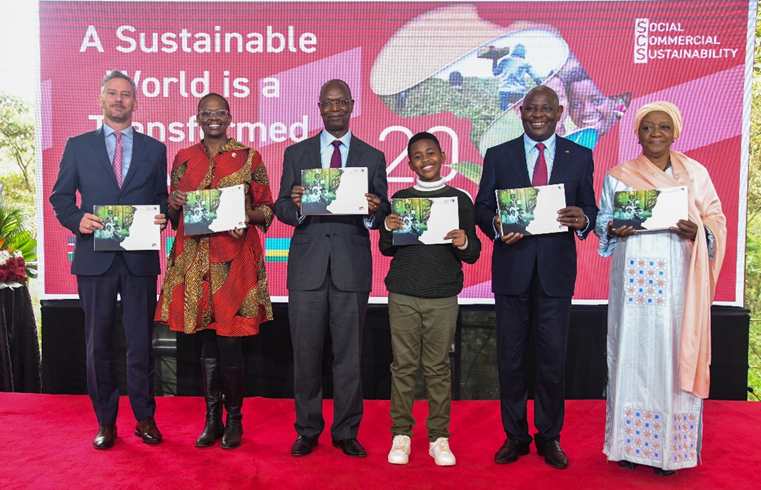Equity Group has unveiled its third annual sustainability report for the year 2023, themed “A sustainable world is a transformed Africa.” The theme points to the significant role that global substantiality practices can have on transformation of the African continent, a challenge that Equity Group has undertaken to lead.
The report exemplifies Equity’s unwavering commitment to socio-economic and environmental transformation across its entire business. It showcases Equity’s dedication to sustainable business practices and the integration of Environmental, Social, and Governance (ESG) aspirations into our core operations including the integration of the Task Force for Nature Related Finance Disclosures as a new focus beyond climate risk management.
Speaking during the unveiling of the report, Equity Group Managing Director and CEO, Dr. James Mwangi, stated, “Today, our business model encompasses a tri-engine approach with an economic focus, a social focus, and a nature, and environmental focus, all working to achieve positive impact. We have not only applied our efforts to realizing social impact, but also have a strong focus on environmental and nature stewardship, promoted through an intentional approach to addressing our own footprint and imparting knowledge to de-risk and empower our broader ecosystem. Additionally, we understand that a sustainable future requires mindful consideration of our impact on the planet, and this report demonstrates how Equity is leading the charge in this effort.”
Professor Isaac Macharia, Chairman of Equity Group, underscored the importance of this report in providing an unwavering vision to be a catalyst for sustainable, socio-economic prosperity in Africa.
“As a purpose-led institution, we understand the important role we play both in the economy and society. We strongly believe that deepening sustainability is not just a moral imperative, but also critical for the long-term health of the business, as sustainable institutions are better placed to thrive and create value for all stakeholders in the long term,” said Professor Macharia.
He further noted, “Our strategic ambition envisioned in the Group’s Africa Recovery and Resilience Plan (ARRP), which aims to achieve long-term transformation of the continent, requires the support and participation of diverse stakeholders. These valuable strategic partnerships with Development Finance Institutions (DFIs), global implementation partners and social institutions have enabled us to deliver a wide variety of social and commercial outcomes with sustainable results.”
The 2023 Sustainability Report epitomizes Equity Group’s proactive approach to driving positive change in society and continues to attract global accolades with Brand Finance ranking the Bank as the Second Strongest Banking Brand in the World and as the Most Valuable Brand in East and Central Africa.
In addition, the International Finance Corporation (IFC) ranked the Group as the global leader with the highest number of climate-related transactions among 258 financial institutions worldwide. The Group also earned the recognition of Euromoney as the Best Bank for Corporate Social Responsibility in Africa for 2 years running.
Zainab Bangura, the UN Under-Secretary-General and Director-General of the United Nations Office in Nairobi, commended Equity for exemplifying how businesses can prioritize sustainability while achieving profitability.
“Sustainable development requires an integrated approach that considers both environmental concerns as well as social development. The work you do as Equity makes it clear that the role of the private sector in delivering a more sustainable world is key. You are leading the way in showing the world that profitability and sustainability can co-exist,” she said.
The 2023 sustainability report unpacks how Equity is walking the talk within its business operations across the seven markets it runs offices in; Kenya, Uganda, Tanzania, South Sudan, Rwanda, DRC and in Ethiopia where it operates a representative office as it aims to deepen
environmental stewardship.
The report further showcases Equity Group’s steadfast commitment to its social engine ‘program pillars.’ Education and Leadership Development: Equity Group Foundation seeks to break the cycle of poverty and develop the next generation of leaders through increased access to secondary and tertiary education.
The Wings to Fly and Elimu scholarship programs have seen 60,009 brilliant scholars receive comprehensive high school scholarships, while the Equity Leaders Program (ELP) has supported 23,825 University scholars and alumni of the program. The program has seen 891 scholars attend global universities, including 199 who have attended the Ivy League universities.
Health: In its flagship Health program, Equity Group Foundation has increased access to comprehensive health financing and private sector-led, affordable, high-quality, and standardized health services. At the end of 2023, Equity Afya had launched a total of 98 outpatient medical centers in Kenya and so far, it has been able to manage over 2.1m patient visits. Equity Afya continues in its expansion strategy, with ongoing rollout in DRC, and continues to avail quality, affordable health services across the franchise network.
Food and Agriculture: Equity Group Foundation helps create jobs, improve market access, and expand agricultural production by working in partnership with small and medium-sized farmers to increase their production capabilities, business acumen, and access to technology
and financial services. In the agriculture sector, EGF under its Food and Agriculture pillar has impacted over 3.8 million small scale farmers and supported over 292,362 MSMEs in the agriculture sector. It has delivered these efforts through technology, training of over 186,077
farmers and over 18,030 Micro-Small and Medium Agriculture Enterprises, access to markets and access to finance.



